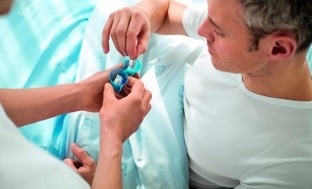
The stronger sex often suffers from disorders of the urogenital system in adulthood. The causes of unpleasant symptoms are very different, so it can be dangerous to choose a drug for men with prostatitis on its own.
Inflammatory diseases require an integrated approach as well as diagnostic tests to prescribe the right therapy.
Prostatitis and its manifestations
One of the most common diseases in men is prostatitis, after 40 years the stronger one occurs in almost one in five. The disease causes many inconveniences and does not allow a person to live a full life. The disease appears as a result of alcohol consumption, sedentary lifestyle, malnutrition, or unscrupulous sexual activity.
The main manifestations of the disease are:
- Severe pulling pain in the lower abdomen.
- Disturbing the selection system.
- Frequent urination, especially at night.
- Discomfort or pain during intercourse.
- Erectile dysfunction or transient impotence.
- Foreign matter in the urine (blood or pus).
Prostate problems occur suddenly or within a short period of time (usually within a week). Fearing that he or she will consult a specialist, many men look for a drug suitable for prostatitis without the recommendation of a doctor. The pharmacy today offers a wide variety of drugs and in most cases does not require a prescription to sell them (except for antibiotics). When looking for the right medicine, keep in mind that improper therapy or timely help from a doctor can lead to complications of the disease. As a result, prostate adenoma, cancer, infertility, and impotence easily develop.
Main methods of treatment
Modern pharmacology offers a wide range of drugs and medications in the fight against prostatitis. Each differs in its composition, release form and pattern of use. One skilled in the art will prescribe medications for the treatment of chronic prostatitis or in the acute phase after the patient has undergone a diagnostic test. You must have a blood test, a urine test and an ultrasound test.
In the early stages of the disease, when the pathogen of the inflammatory process has not been identified, a wide range of drugs are prescribed. After receiving the test results, the therapy is modified and the antibiotics are replaced by more specialized drugs.
What is the best medicine for prostatitis? A specialist will help you choose the medicine, focusing on the type of disease.
Some examples of common treatment regimens:
- Acute stage of infectious prostatitis (caused by E. coli, Klebsiella, enterococcus, pseudomonas). In this situation, an antibiotic is prescribed from the group of cephalosporins or tetracyclines. Painkillers as well as topical suppositories are used to relieve symptoms. The complex therapy lasts for 2 weeks.
- Chronic form. Prescribed drugs in the form of suppositories or capsules for prostatitis according to a certain scheme. Antibiotics are used only as the disease worsens, in the remission stage only phytopreparations.
- Latent prostatitis. Antibacterial therapy is prescribed for 14 days, and suppositories are used for the local action of the inflammatory process. If the disease does not cause discomfort, antispasmodics and painkillers are not needed.
- Non-infectious prostatitis. Medications to normalize urine output and antispasmodics to eliminate urethral spasms and edema. Pain syndrome is relieved by painkillers. The cure is 14 days.
The effectiveness of your treatment depends largely on what medications you are taking for prostatitis, but also on the treatment regimen and mode of action you choose. The complex is selected by a person skilled in the art, taking into account the need to influence the prostate and the inflammatory process in some way.
The main groups of drugs used by urologists to treat prostatitis are:
- Antibiotics.
- Non-steroidal drugs.
- Analgesics.
- Immunomodulators.
- Homeopathy and herbal remedies.
Your doctor will prescribe several tablets at the same time or add candles with the desired properties for injections. This integrated approach (the use of drugs for different actions) allows for good results and effective treatment of the disease. Some medications should be taken until the symptoms disappear, others completely. All doctor's recommendations should be strictly adhered to and the established treatment regimen should not be violated.
Antibacterial drugs

Any inflammatory process in the body is suppressed by antibiotics. Prostatitis caused by infection is no exception. The specialist prescribes a course of antibacterial agents after receiving the test results, visual examination, palpation of the prostate and examination of the patient.
The appropriate group is chosen depending on the type of disease:
- fluoroquinols.is used to treat chronic disease as well as severe stages. These drugs are effective with few side effects. They quickly relieve inflammation and inhibit the growth of pathogenic bacteria.
- Tetracyclines.Used to treat the acute phase of the disease. The main contraindications are leukopenia, as well as renal pathology, a possible manifestation of an allergic reaction.
- Penicillins.May cause unwanted side effects such as drowsiness, dermatitis, lethargy, tinnitus and headache. Therefore, it should be used with caution in patients with chronic kidney and liver disease.
Modern medications begin to act quickly on the problem area and allow you to cope with the inflammatory process in a matter of days. The urologist prescribes an antibiotic against prostatitis, taking into account the patient's state of health, the nature of the disease, and his age. The specialist takes into account the qualification of proven drugs as well as the latest developments in the market.
Non-steroidal drugs
Anti-inflammatory drugs used to treat prostatitis can quickly relieve lumbar pain, reduce inflammation, and significantly alleviate the condition. Immediately after ingestion, a few hours later, the patient notices a reduction in pain, discomfort, and normalization of urination. Non-steroidal anti-inflammatory drugs reduce muscle tone in the lumbar region and thus improve well-being.
Many patients, noticing better changes, neglect to take other medications and not just aggravate the condition. It is to be understood that such drugs are consumed in conjunction with antibiotics and other devices.
Alpha-blockers for pain relief
Medications in this category are prescribed to relax muscles and improve urine flow. Such drugs are present in almost all treatment regimens, regardless of the form of the disease (acute phase, chronic stage). It should be recalled that the drugs themselves are no longer aimed at treatment, but only at blocking and removing the main unpleasant manifestations that do not allow a person to lead a normal life.
Immune modulators to support the body
In the acute phase or chronic form of prostatitis, it is not possible to do without drugs that increase the body's defenses. Modulators affect cellular and humoral immunity and contribute to the body’s resistance to infections, increase overall tone, and normalize many processes.
Medicines in this group are used in combination with other medicines and have an effect in the first hours after administration.
Homeopathy and herbal remedies
Herbal medicines or homeopathy are just as popular as any other type of medicine. They are safe for the body, yet equally effective.
Medicines are available in the form of suppositories or tablets. They are sold freely without a doctor's prescription. Before taking it, it is important that you read the instructions carefully and follow the recommended doses.
Prostatitis dosage form

All drugs presented in pharmacies have different release forms. Not everyone knows what the peculiarity of choosing one species or another is. It is more convenient to drink tablets, but the injections work faster and allow the right concentration of the active ingredient to reach the site of inflammation more quickly.
The following formulations are most commonly prescribed by professionals:
- Injections.One of the best forms of treatment, although it is quite uncomfortable during the injection. Any treatment for prostatitis almost always begins with the appointment of injections.
- Rectal candles.Due to the local effect, this form of the drug can quickly relieve pain, relieve inflammation and activate blood flow. Suppositories for prostatitis may be with antibiotics and may also contain a non-steroidal anti-inflammatory or anesthetic drug.
- Pills.The most convenient form as it accepts quickly. But through the stomach, drugs get into the bloodstream worse, and the effect may not be the same as with other drugs.
The mode of treatment and the form of release of the drug by the physician are selected based on the general condition of the patient and the need for a particular effect. If the therapy is chosen incorrectly, or the patient has not followed the established schedule of admission, the treatment regimen, then the prostatitis will flow into a chronic form. This form of the disease is more difficult to treat and can have serious consequences. Therefore, problems with the prostate gland should not be self-medicated, but you should immediately contact a competent professional who will consider all the features of the body and prescribe the correct treatment.
























